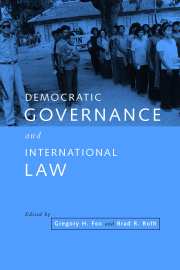Book contents
- Frontmatter
- Contents
- List of contributors
- List of acknowledgments
- Introduction: the spread of liberal democracy and its implications for international law
- PART I THE NORMATIVE FOUNDATIONS OF A RIGHT TO POLITICAL PARTICIPATION
- PART II DEMOCRACY AND INTER-STATE RELATIONS
- PART III DEMOCRACY AND THE USE OF FORCE
- 7 Sovereignty and human rights in contemporary international law
- 8 “You, the People”: pro-democratic intervention in international law
- 9 Pro-democratic intervention by invitation
- 10 The illegality of “pro-democratic” invasion pacts
- 11 International law and the “liberal peace”
- PART IV DEMOCRATIZATION AND CONFLICTING IMPERATIVES
- PART V CRITICAL APPROACHES
- Index
10 - The illegality of “pro-democratic” invasion pacts
Published online by Cambridge University Press: 04 May 2010
- Frontmatter
- Contents
- List of contributors
- List of acknowledgments
- Introduction: the spread of liberal democracy and its implications for international law
- PART I THE NORMATIVE FOUNDATIONS OF A RIGHT TO POLITICAL PARTICIPATION
- PART II DEMOCRACY AND INTER-STATE RELATIONS
- PART III DEMOCRACY AND THE USE OF FORCE
- 7 Sovereignty and human rights in contemporary international law
- 8 “You, the People”: pro-democratic intervention in international law
- 9 Pro-democratic intervention by invitation
- 10 The illegality of “pro-democratic” invasion pacts
- 11 International law and the “liberal peace”
- PART IV DEMOCRATIZATION AND CONFLICTING IMPERATIVES
- PART V CRITICAL APPROACHES
- Index
Summary
INTRODUCTION
Few of the leading scholars who now proclaim “an emerging right to democratic governance” in international law have asserted that right as a general legal justification for military action against non-democratic regimes. A general license to impose democracy at gunpoint fits poorly, most concede, with the scheme of international peace and security embodied in the United Nations Charter. Redress of a human rights violation – if that is what a denial of democracy is – is seldom propounded per se as an exception to the peremptory obligation of States “to refrain … from the threat or use of force against the territorial integrity and political independence of any state, or in any other manner inconsistent with the Purposes of the United Nations.”
Yet if the edifice of established peace and security norms is impervious to frontal assault, it remains vulnerable to the Trojan Horse. That is because there is a basis in international law for the proposition that “the lawful governmental authorities of a State may invite the assistance in the territory of military forces of other states or collective organizations in dealing with internal disorder as well as external threats.” Given the principle that a State may consent to foreign uses of force in its territory, adherents of the democratic entitlement thesis may seek to open the door to pro-democratic intervention in two ways: (1) by designating a government that enjoys an electoral mandate (or other “democratic” credentials), but not effective control, as bearer of the legal capacity to render contemporaneous consent on behalf of the State; (2) by validating the effort of an elected government to render the State's consent in advance, by treaty, to forcible restoration of the constitutional government upon the occurrence of a revolution or coup d'état.
- Type
- Chapter
- Information
- Democratic Governance and International Law , pp. 328 - 342Publisher: Cambridge University PressPrint publication year: 2000
- 1
- Cited by



